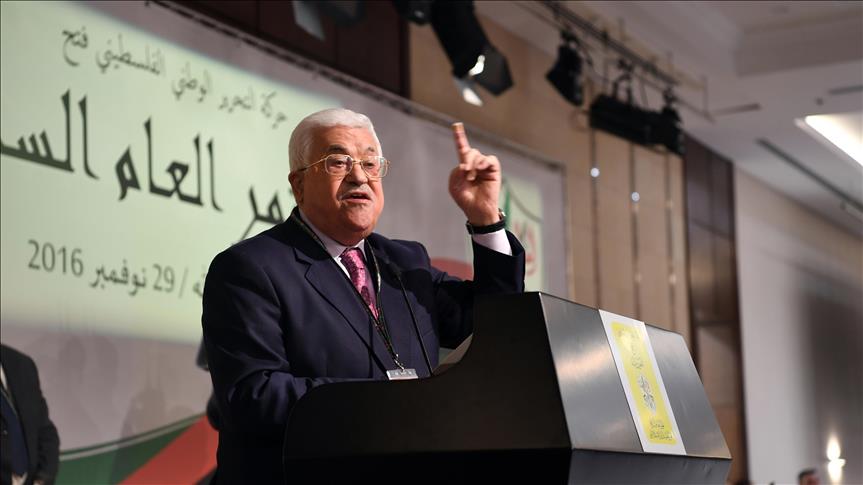Landmark Fatah congress becomes political battlefield
Mahmoud Abbas is likely to emerge from congress stronger, but divisions in ruling Fatah party have grown, experts say
 Palestinian President Mahmoud Abbas delivers a speech during the 7th General Assembly meeting of Fatah Movement at Palestinian Prime Ministry office Mukataa in Ramallah, West Bank on November 29, 2016. ( Palestinian Presidency / Handout - Anadolu Agency )
Palestinian President Mahmoud Abbas delivers a speech during the 7th General Assembly meeting of Fatah Movement at Palestinian Prime Ministry office Mukataa in Ramallah, West Bank on November 29, 2016. ( Palestinian Presidency / Handout - Anadolu Agency )
JERUSALEM
Amid mounting anger in the middle of Gaza City, photos of Palestinian President Mahmoud Abbas went up in flames.
The high-energy protest in early October -- an attempted show of strength by Abbas's rival, Mohammed Dahlan -- dissipated almost as abruptly as it began, with the buses that shuttled his supporters in from around the blockaded Gaza Strip quickly refilling.
In the one month since then, tension has mounted between the two men, especially ahead of the General Congress of the Fatah movement, the political faction that dominates Palestinian politics, headed by Abbas and which Dahlan was expelled from.
No congress has been held since 2009, and this one, held Tuesday, has exposed the divisions within Palestinian politics, according to Palestinian political experts, as Abbas attempts to fight off Dahlan's challenge for the Palestinian leadership.
"In my opinion, the main goal is to strengthen Fatah as the de facto dominant power within the Palestinian Authority," Nur Arafeh, policy fellow at the Palestinian Al-Shabaka think tank, told Anadolu Agency.
The gathering's image as a way for Abbas to consolidate power -- as opposed to the stated goal of paving the way for a successor -- has been bolstered by rumors that he is trying to expel his internal opponents by only inviting supporters to the event.
"It’s a sign of weakness that they want to re-establish their dominance. That Mahmoud Abbas is convening this conference without inviting thousands of members is a sign of weakness," said Arafeh.
Dahlan's return to the forefront of Palestinian politics has exposed those weaknesses, said Arafeh, but there is a limit to his strength. While the support of other Arab states has emboldened Dahlan, who has been living in the United Arab Emirates, Arafeh said, their failure to convince Abbas to allow Dahlan to return to Palestine has shown that he needs more than the support of foreign governments.
A gathering of Fatah’s internal opposition at the Qalandiya refugee camp -- located between the de facto Palestinian administrative capital, Ramallah, and Jerusalem -- was cancelled Tuesday, with its organizers claiming they were intimidated by Palestinian security forces.
They instead met in the Al-Amari refugee camp, where a month earlier a similar meeting was stormed by security forces and its participants accused of being Dahlan supporters.
Among them was Dimitri Diliani, a member of Fatah's Revolutionary Council and its "social justice committee", who was excluded from the congress because of his role at the meeting.
"The issue is not Dahlan as a person, it is the coalition that is being formed by many of the historic and young leaders of Fatah who oppose the autocracy of President Abbas -- both within Fatah and within the overall Palestinian political scene," Diliani told Anadolu Agency.
"President Abbas has turned the Dahlan problem into a phenomenon that included all the people within Fatah that adhere to the bylaws; who reject the dictatorship he's running; and who are upset by the current political direction. Basically, all the opposition," he said.
The idea that the congress is about Abbas clamping down on his opposition is not supported by everyone, however, and many believe the threat posed by Dahlan is overstated.
Dahlan's strength stemmed from his role as head of the Palestinian Authority security forces in the Gaza Strip until they were defeated by the Hamas resistance movement in 2007, but he is not necessarily popular among the population.
According to the most recent survey by the Palestinian Center for Policy and Survey Research, only 5 percent of Palestinians would support Dahlan as a candidate to replace Abbas -- a long way behind Marwan Barghouti, the imprisoned leader of Fatah's armed wing, who is supported by more than a third of the population.
The same survey said almost two-thirds of Palestinians oppose Dahlan's return to politics.
"Dahlan was an issue. He might be an issue in the future. In the post-Abbas era, he could raise his flag again, but for the time-being, this line is closed as far as the [Fatah] convention is concerned," said Mahdi Abul Hadi, head of the Palestinian Academic Society for the Study of International Affairs (PASSIA).
He said Abbas is not focused on his opponents as much as he is on consolidating his own position.
"It's not a question of stronger or weaker," he said. "It’s a question of emphasizing his position, his agenda and his direction."
Reporting by Kaamil Ahmed
Anadolu Agency website contains only a portion of the news stories offered to subscribers in the AA News Broadcasting System (HAS), and in summarized form. Please contact us for subscription options.







